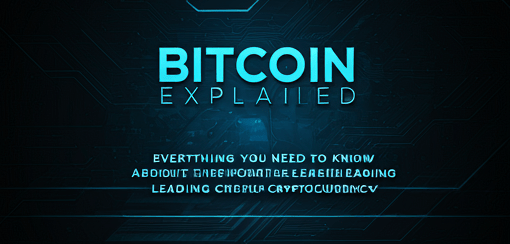In the ever-evolving landscape of finance and technology, Bitcoin has emerged as a revolutionary force, challenging traditional notions of currency and value transfer. As the world’s first and most well-known cryptocurrency, Bitcoin has captured the imagination of investors, technologists, and the general public alike. This comprehensive guide will delve into the intricacies of Bitcoin, exploring its origins, technology, economic impact, and future potential.
Table of Contents
- Introduction to Bitcoin
- What is Bitcoin?
- The Origins of Bitcoin
- Key Features of Bitcoin
- How Bitcoin Works
- Blockchain Technology Explained
- Mining and Transaction Verification
- Bitcoin Wallets and Addresses
- The Economics of Bitcoin
- Bitcoin’s Supply and Demand
- Bitcoin Halving Events
- Bitcoin as a Store of Value
- Buying, Selling, and Using Bitcoin
- Cryptocurrency Exchanges
- Peer-to-Peer Bitcoin Transactions
- Bitcoin ATMs and Other Acquisition Methods
- Real-World Uses of Bitcoin
- Bitcoin Security and Privacy
- Cryptography in Bitcoin
- Best Practices for Securing Your Bitcoin
- Anonymity and Pseudonymity in Bitcoin Transactions
- The Bitcoin Ecosystem
- Bitcoin Core and Development
- Notable Bitcoin Forks
- The Lightning Network and Scalability Solutions
- Regulatory Landscape of Bitcoin
- Global Regulatory Approaches
- Taxation of Bitcoin
- Anti-Money Laundering (AML) and Know Your Customer (KYC) Regulations
- Bitcoin’s Environmental Impact
- Energy Consumption in Bitcoin Mining
- Sustainable Mining Initiatives
- The Debate on Bitcoin’s Carbon Footprint
- Bitcoin vs. Other Cryptocurrencies
- Comparing Bitcoin to Altcoins
- Bitcoin’s Market Dominance
- The Future of Cryptocurrency Competition
- The Future of Bitcoin
- Potential Technological Advancements
- Bitcoin’s Role in the Future of Finance
- Challenges and Opportunities Ahead
- Conclusion: Bitcoin’s Place in the Digital Age
Introduction to Bitcoin
What is Bitcoin?
Bitcoin is a decentralized digital currency that enables instant payments to anyone, anywhere in the world. Unlike traditional currencies, Bitcoin operates on a peer-to-peer network without the need for intermediaries such as banks or governments. It was the first implementation of the concept of “cryptocurrency,” which uses cryptography to control the creation and transfer of money.
The Origins of Bitcoin
Bitcoin was introduced in 2008 by an anonymous person or group using the pseudonym Satoshi Nakamoto. The concept was first described in a whitepaper titled “Bitcoin: A Peer-to-Peer Electronic Cash System.” The first Bitcoin block, known as the genesis block, was mined on January 3, 2009, marking the official birth of the Bitcoin network.
Key Features of Bitcoin
- Decentralization: No single authority controls Bitcoin.
- Transparency: All transactions are recorded on a public ledger.
- Limited Supply: Only 21 million Bitcoins will ever be created.
- Pseudonymity: Users can transact without revealing their real-world identity.
- Immutability: Once recorded, transactions cannot be altered or reversed.
- Divisibility: Each Bitcoin can be divided into 100 million satoshis.
How Bitcoin Works
Blockchain Technology Explained
At the heart of Bitcoin is the blockchain, a distributed ledger that records all transactions across a network of computers. This technology ensures transparency, security, and immutability of the Bitcoin network. Here’s how it works:
- Transactions are grouped into blocks.
- Miners verify and add these blocks to the blockchain.
- Each block contains a reference to the previous block, forming a chain.
- This chain of blocks creates an unalterable record of all Bitcoin transactions.
Mining and Transaction Verification
Bitcoin mining is the process by which new Bitcoins are created and transactions are verified. Miners use powerful computers to solve complex mathematical problems. The first miner to solve the problem gets to add the new block to the blockchain and is rewarded with newly minted Bitcoins and transaction fees.
Key aspects of mining include:
- Proof of Work (PoW) consensus mechanism
- Difficulty adjustment to maintain consistent block times
- The importance of mining in maintaining network security
Bitcoin Wallets and Addresses
To receive, store, and send Bitcoin, users need a Bitcoin wallet. A wallet can be software-based (on a computer or smartphone) or hardware-based (a physical device). Each wallet contains:
- A public key: Your Bitcoin address, which you share to receive Bitcoin.
- A private key: A secret code that allows you to spend your Bitcoin.
It’s crucial to keep your private key secure, as losing it means losing access to your Bitcoin.
The Economics of Bitcoin
Bitcoin’s Supply and Demand
Bitcoin’s economic model is based on a fixed supply and variable demand:
- Fixed Supply: Only 21 million Bitcoins will ever be created.
- Variable Demand: Influenced by factors such as adoption, regulation, and market sentiment.
This scarcity model is often compared to precious metals like gold, leading some to call Bitcoin “digital gold.”
Bitcoin Halving Events
Approximately every four years, the reward for mining new blocks is halved. This event, known as “halving,” reduces the rate at which new Bitcoins are created, effectively decreasing the inflation rate of Bitcoin over time. Past halving events have often preceded significant price increases.
Bitcoin as a Store of Value
Many investors view Bitcoin as a store of value and a hedge against inflation, especially in countries with unstable currencies. The argument for Bitcoin as “digital gold” includes:
- Limited supply
- Durability (digital assets don’t degrade)
- Portability (can be transferred globally with ease)
- Divisibility (can be divided into very small units)
Buying, Selling, and Using Bitcoin
Cryptocurrency Exchanges
Cryptocurrency exchanges are platforms where you can buy, sell, and trade Bitcoin and other cryptocurrencies. Popular exchanges include:
- Coinbase
- Binance
- Kraken
- Gemini
When choosing an exchange, consider factors such as:
- Security measures
- Fees
- Available trading pairs
- Regulatory compliance
- User interface and experience
Peer-to-Peer Bitcoin Transactions
Bitcoin can be transferred directly between individuals without intermediaries. This can be done through:
- Peer-to-peer marketplaces like LocalBitcoins
- Bitcoin meetups and local communities
- Direct wallet-to-wallet transfers
Bitcoin ATMs and Other Acquisition Methods
Bitcoin ATMs allow users to buy Bitcoin with cash or debit cards. Other methods of acquiring Bitcoin include:
- Earning Bitcoin for goods or services
- Bitcoin faucets (websites that give away small amounts of Bitcoin)
- Bitcoin mining (though this is no longer profitable for most individuals)
Real-World Uses of Bitcoin
While initially seen primarily as an investment, Bitcoin is increasingly being used for:
- Online purchases
- Remittances
- Charitable donations
- Travel bookings
- Gift cards
Some companies, like Microsoft and Overstock, directly accept Bitcoin payments.
Bitcoin Security and Privacy
Cryptography in Bitcoin
Bitcoin uses several cryptographic techniques to ensure security:
- Elliptic Curve Digital Signature Algorithm (ECDSA) for digital signatures
- SHA-256 hash function for mining and creating Bitcoin addresses
- Merkle trees for efficient verification of transactions
Best Practices for Securing Your Bitcoin
To keep your Bitcoin safe:
- Use a hardware wallet for large amounts
- Enable two-factor authentication on exchanges and web wallets
- Keep your private keys offline and secure
- Use unique, strong passwords for all Bitcoin-related accounts
- Be cautious of phishing attempts and verify all transaction details
Anonymity and Pseudonymity in Bitcoin Transactions
While Bitcoin transactions are pseudonymous (linked to addresses rather than real-world identities), they are not completely anonymous. Techniques to enhance privacy include:
- Using new addresses for each transaction
- Coin mixing services (though these may have legal implications)
- Privacy-focused wallets
The Bitcoin Ecosystem
Bitcoin Core and Development
Bitcoin Core is the reference implementation of the Bitcoin protocol. It is maintained by a group of developers who work on improving the codebase. Key aspects include:
- Open-source development
- Consensus-driven decision making
- Regular updates and improvements
Notable Bitcoin Forks
Bitcoin has undergone several “forks,” creating new cryptocurrencies. Notable forks include:
- Bitcoin Cash (BCH)
- Bitcoin SV (BSV)
- Bitcoin Gold (BTG)
These forks often arise from disagreements within the community about Bitcoin’s future direction.
The Lightning Network and Scalability Solutions
The Lightning Network is a “layer 2” solution built on top of Bitcoin to enable faster and cheaper transactions. Other scalability solutions being explored include:
- Segregated Witness (SegWit)
- Schnorr signatures
- Taproot
These developments aim to increase Bitcoin’s transaction capacity and efficiency.
Regulatory Landscape of Bitcoin
Global Regulatory Approaches
Bitcoin regulation varies widely across countries:
- Some nations, like El Salvador, have adopted Bitcoin as legal tender
- Others, like China, have banned cryptocurrency trading and mining
- Many countries are still developing regulatory frameworks
Taxation of Bitcoin
In many jurisdictions, Bitcoin is treated as property for tax purposes. This means:
- Capital gains tax may apply when selling Bitcoin for profit
- Income tax may apply when receiving Bitcoin as payment
- Detailed record-keeping is crucial for tax compliance
Anti-Money Laundering (AML) and Know Your Customer (KYC) Regulations
Many Bitcoin exchanges and services are required to implement AML and KYC procedures, including:
- Identity verification
- Transaction monitoring
- Reporting of suspicious activities
Bitcoin’s Environmental Impact
Energy Consumption in Bitcoin Mining
Bitcoin mining requires significant computational power, leading to high energy consumption. This has sparked debates about Bitcoin’s environmental impact.
Sustainable Mining Initiatives
Efforts to make Bitcoin mining more sustainable include:
- Using renewable energy sources for mining operations
- Developing more energy-efficient mining hardware
- Exploring alternative consensus mechanisms
The Debate on Bitcoin’s Carbon Footprint
The discussion around Bitcoin’s environmental impact is ongoing, with arguments on both sides:
- Critics argue that Bitcoin’s energy use is unsustainable
- Supporters contend that Bitcoin incentivizes the development of renewable energy and that its energy use is justified by its value to society
Bitcoin vs. Other Cryptocurrencies
Comparing Bitcoin to Altcoins
While Bitcoin was the first cryptocurrency, thousands of alternative cryptocurrencies (“altcoins”) now exist. Key differences can include:
- Consensus mechanisms (e.g., Proof of Stake vs. Proof of Work)
- Smart contract capabilities
- Privacy features
- Governance models
Bitcoin’s Market Dominance
Despite the proliferation of altcoins, Bitcoin maintains a dominant market position, often referred to as “Bitcoin dominance.” Factors contributing to this include:
- First-mover advantage
- Network effect
- Brand recognition
- Perceived stability relative to other cryptocurrencies
The Future of Cryptocurrency Competition
As the cryptocurrency space evolves, we may see:
- Increased specialization among cryptocurrencies
- Interoperability solutions between different blockchains
- Continued innovation in blockchain technology
The Future of Bitcoin
Potential Technological Advancements
Future developments in Bitcoin may include:
- Improved privacy features
- Enhanced smart contract capabilities
- Further scaling solutions
- Integration with emerging technologies like AI and IoT
Bitcoin’s Role in the Future of Finance
Bitcoin could play a significant role in reshaping the financial landscape:
- As a global, borderless currency
- As a store of value in inflationary environments
- As a catalyst for financial innovation and inclusion
Challenges and Opportunities Ahead
Bitcoin faces several challenges:
- Regulatory uncertainty
- Scalability issues
- Public perception and adoption hurdles
However, these challenges also present opportunities for growth and innovation in the Bitcoin ecosystem.
Conclusion: Bitcoin’s Place in the Digital Age
Bitcoin has come a long way since its inception in 2009, evolving from an obscure cryptographic experiment to a globally recognized financial asset and technological innovation. As the world’s leading cryptocurrency, Bitcoin has sparked a revolution in how we think about money, value transfer, and financial systems.
While Bitcoin faces challenges in terms of scalability, regulatory compliance, and environmental concerns, it continues to demonstrate resilience and adaptability. The ongoing development of the Bitcoin protocol, coupled with growing institutional adoption and increasing public awareness, suggests that Bitcoin will likely play a significant role in shaping the future of finance and technology.
As we move further into the digital age, Bitcoin stands as a testament to the power of decentralized systems and the potential for technology to revolutionize long-standing institutions. Whether as a store of value, a medium of exchange, or a catalyst for financial innovation, Bitcoin’s impact on the global economy and technological landscape is undeniable.
As with any investment or new technology, it’s crucial to approach Bitcoin with a balanced perspective, understanding both its potential benefits and risks. By staying informed about the latest developments in the Bitcoin ecosystem and the broader cryptocurrency space, individuals can make educated decisions about their engagement with this groundbreaking technology.
The story of Bitcoin is still being written, and its ultimate place in the digital age remains to be seen. However, one thing is certain: Bitcoin has already left an indelible mark on the worlds of finance, technology, and beyond, and its influence is likely to be felt for years to come.



















